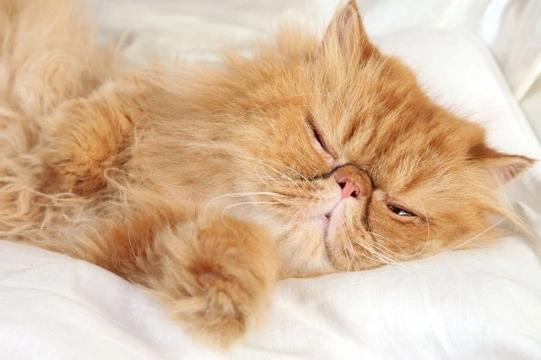
Is snoring in cats a problem?
Snoring in cats is not as common as with snoring in dogs, but nevertheless, a significant number of cat owners will have observed that their cat snores while asleep! For some cats, snoring is no cause for concern and is simply something that you will acknowledge is part of your cat’s normal behaviour throughout the duration of their life, while in others, snoring can be indicative of a more serious underlying issue. If you own a snoring cat, your cat has recently started snoring, or you want to know more, keep reading!
What is snoring?
Snoring is the term used to refer to the audible aspect of noisy breathing when asleep, whether that be in a human or an animal. Snoring is caused by something obstructing the movement of air across the uvula and the soft palate inside of the mouth and throat. The obstruction causes a vibration of the surrounding soft tissue, which leads to the snoring sound that we are all familiar with.
What type of cats snore?
Some breeds of cat, especially Persian cats and others that have short, squashed- looking faces, are much more likely to snore than others, as the shortness of their muzzle and palate causes the necessary obstruction that makes the sound. A significant number of Persian cats snore for exactly this reason, and it is generally considered to be a normal trait of the breed. However, it is wise to get any short-muzzled cat checked over by your vet when you first get them, to ensure that the conformation of their head and muzzle is not interfering with their normal breathing or causing a problem, which might need surgery to correct.Cats that are overweight and not particularly active are much more likely to snore than their fitter, trimmer counterparts are, as the excess fat that lies around the neck can lead to snoring. Snoring in this situation is relatively common, and while of course you should monitor your cat’s health and weight and seek to address things if your cat is running to fat, the snoring in itself is not dangerous in this case.Cats of all other breeds, ages, shapes and sizes may also snore for various other reasons, and whether or not this poses a problem or is indicative of something more serious will vary from case to case.
Some common causes of snoring in cats
There are various possible causes of snoring in cats, some of which are minor or harmless and some of which will require correction or treatment. Some of the most common potential causes of snoring in cats include:
- Allergies to spores, pollen or other triggers of sensitivity
- Normal coughs, colds and snuffles that clear up naturally
- An upper respiratory tract infection that does not go away on its own and may require treatment with antibiotics
- A foreign body lodged in the back of the throat, such as a blade of grass. This is particularly often the case if the onset of the snoring is sudden, and will require removal by your vet
- A polyp or tumour growing within the nasal passages or throat that will require surgical removal
- Feline asthma, a narrowing of the airways of the lungs that often causes snoring among other respiratory symptoms and may require ongoing medication to address
- Feline obesity, leading to a partial obstruction of the airways when your cat is asleep can cause snoring
Is snoring in cats a problem?
The answer to this question really depends on the underlying cause behind the snoring itself. In order to be able to address the issue, it is first important to establish why your cat is snoring, particularly if the snoring is a new development in a cat that has never snored before. You may need to take your snoring cat along to your vet for a check up to find out the root cause of the snoring for certain, and to establish what, if anything can be done about it and if it is a problem.Gentle snoring now and then that does not become progressively worse or appear to be causing any distress to your cat is normally not a problem, although it can occasionally be indicative of allergies or feline asthma, and so you should get your cat checked out by your vet if you are in any doubt.If your cat’s snoring is particularly loud, appears laboured, wakes them up, or is accompanied by noisy breathing or laboured breathing sometimes when they are awake, it is important to arrange an appointment with your vet as soon as possible to get them checked out. Severe breathing problems in cats are not common and not normal. If your cat is breathing with their mouth open, appears to be gasping for air, or is breathing particularly fast (over forty breaths per minute) or shallowly, then this is an emergency situation and you should call your vet right away, whether your cat is asleep or awake at the time.



